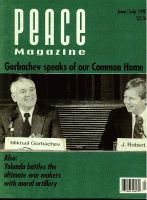
Peace Magazine Jun-Jul 1993, page 5. Some rights reserved.
Search for other articles by various here
Congratulations on "The Battle of the Peace Models" by distinguished researcher Dr. Hanna Newcombe, in the first 1993 edition. Of course the majority in the peace movement should accept convergence of the two models described as world federal government and principled nonviolence. But will they? The publication of follow-up articles regularly could lead eventually to such acceptance and to a clearer focus of the peace message to the public.
Ross Smyth, Montreal
The strongest voice for peace I ever heard came from a veteran of WW2. It was not in the polished form of a journalist. This man had volunteered with his grade twelve class as a group. Only two returned alive. For many years he could not go and stand at the memorial services every November. He does so now because there are so few left to do so. These one time soldiers are a vanishing resource. It is just as important to try and understand the past as it is to take action in the present to-wards a better future. For me peace began at home. The veteran is my father.
Murray Jack, Revelstoke, B.C.
This is a response to Hanna Newcombe's article, "The Battle of the Peace Models." Her article draws contrasts between two polar views, that of world federalists and the of proponents of contrasts between two polar views, that of world federalists and the proponents of nonviolence. There are indeed two different world views here. They conflict on the question of whether it is acceptable in principle to use violence to protect society from greater violence.
I do not think Hanna adequately characterizes the world federalists pole of the debate. Her extreme, at-its-worst brand of world federalism is a defunct ideology that no longer exists today, except perhaps in the fossilized thinking of a few. If no one today is really proposing this position, it serves no purpose to set it up as one pole in the current debate.
Since there is only one world federalist organization in this country, the World Federalists of Canada, readers may have been left thinking that the "worst case" world federalists position she describes is ours. It is not.
Instead, world federalism today is closer to the position that she concludes with: the "convergence" of dinosaur world govemmentalism and principled nonviolence. Her convergence position, in fact, is my own view. It includes the idea of subsidies, decentralization, minimum force, maximum inclusiveness in governance, and citizen empowerment. This contemporary world federalist view is the one that is most usefully contrasted to that of principled nonviolence. The "battle" then is as follows:
On the principled nonviolence side, you get two key points:
On the world federalists side you get:
Both the best and worst qualities of human nature can be reinforced and shaped by the design of institutions. The issue is not one of violent coercion but of organization itself-whether there is a need for collective, central government at the global level to deter war and build peace. I hope Hanna's article starts a real debate on this.
Dieter Heinrich, Toronto
NUCLEAR POWER ALSO A CONCERN
Re: World Scientists Warning on Humanity, p.2 3, March/April 93. I think it is important that you note that the above document does not mention nuclear power. The politics of this omission is that many of the signatories of this document are nuclear advocates. In a separate initiative, we were involved in obtaining a declaration by some 36 laureates which the IAEA and others were able to exclude from presentation to a formal session of UNCED 92. UCS, of which I am a longtime member, felt that their support of our declaration might interfere with their own, an argument I found questionable.
I hope you will publish our declaration, since I believe it confirms even more closely to the goals of the peace movement.
F.H. Knelman, PhD
The following is a brief copy of the declaration made by the Nobel Laureates, anyone wishing to obtain a full copy may write to the magazine for it:
We, the undersigned Nobel Laureates, urge all nations and peoples to unite in the great cause of creating a secure and sustainable earth.
This important conference, Earth Summit, links two key issues of sustainability-environment and development-and offers a unique opportunity to find global solutions to problems threatening our common future.
Recognizing that we all inhabit one Earth and share common responsibility to posterity, we urge you to act decisively.
Prepared by the Nuclear Age Peace Foundation.

Peace Magazine Jun-Jul 1993, page 5. Some rights reserved.
Search for other articles by various here